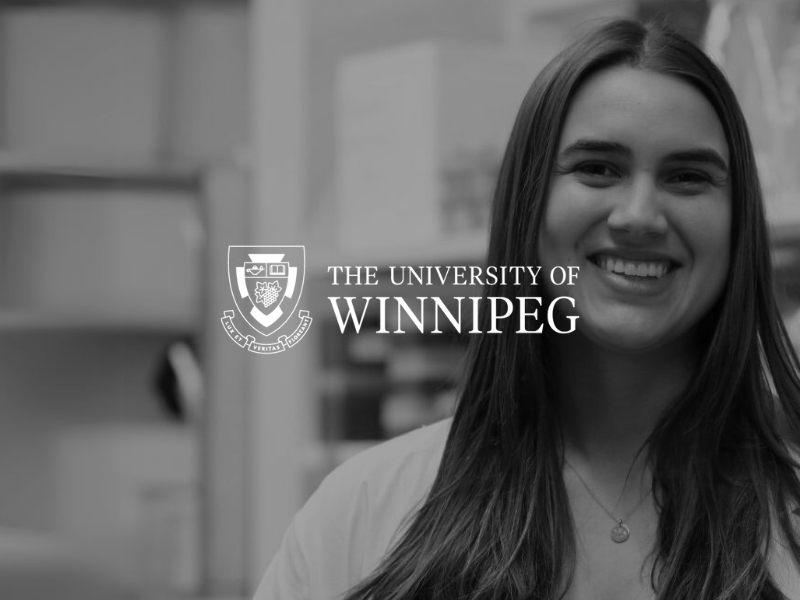Jasmyne Storm, a Master of Science student in Bioscience, Technology, and Public Policy, is helping put exciting research from UWinnipeg on the map.
Storm said the Most Promising Bioscience Student of the Year award she received from Bioscience Association Manitoba (BAM) is a huge honor for her and a big win for the lab.
“It feels pretty amazing. Not only for my work to be recognized in this way, but also because it reflects the important work being done by our lab,” said Storm. “It still doesn’t feel real.”
Storm is studying a potential therapeutic treatment that could help improve health outcomes for infants who are exposed to early life stress. Her research is conducted under the supervision of Dr. Sanoji Wijenayake, whose lab at UWinnipeg was established in January 2022.
“It’s a great feeling to have Jasmyne recognized this way, because she was competing for this award with a lot of very talented and promising biomedical graduate students from Manitoba,” Dr. Wijenayake said.
BAM celebrates the accomplishments and future potential of the bioscience industry in Manitoba, and the Most Promising Bioscience Student of the Year award recognizes students who demonstrate outstanding academic achievements, leadership, community involvement, and a dedication to excellence.
“This award was tailor-made for Jasmyne,” Dr. Wijenayake said. “She is academically inclined and has received numerous highly competitive awards and scholarships during graduate school. She is also a well-rounded student who does a lot of community work, extra-curricular activities, teaching and mentoring. She is also a UWinnipeg Faculty of Graduate Studies student ambassador.”
Storm’s research at UWinnipeg focuses on a biochemical pathway in the body called the heat shock response. This cellular response targets protein irregularities caused by stress and inflammation, then either repairs them or identifies them to be discarded. Proteins are the workhorses of the cell, and protein dysfunction can lead to disease.
“Proteins can become dysfunctional for any number of reasons,” Storm said. “The body naturally ensures that these proteins don’t accumulate in our cells.”
Storm is researching if a component of human breastmilk can keep the heat shock response activated longer, giving infants a better chance to cope with early life stress.
“We study these tiny little fat droplets called milk-derived extracellular vesicles (MEVs). MEVs deliver biological material from mothers to their babies,” explained Dr. Wijenayake. “The most incredible thing about MEVs is that they survive digestion, and they are taken up by tissues and organs after milk feeding. But, what they do once they get into babies’ cells and tissues needs to be studied in detail.”
“So far, MEVs have been shown to fight against pro-inflammation in the intestines, liver, and lungs,” said Storm, “but not a lot of research has looked at the effects of MEVs in the brain.”
Wijenayake Lab focuses on studying if MEVs may help counter pro-inflammation in an infant’s developing brain.
“Research has shown that exposure to maternal stress, such as diet, immune status, and psychosocial factors, can trigger neuroinflammation in infants,” said Storm. “It can increase their risk of developing neuropsychiatric or neurodevelopmental disorders, as well as other metabolic disorders in later life.”
“We know MEVs are beneficial in other parts of the body,” she added, “so we’re studying how MEVs isolated from breastmilk can benefit the development of the brain.”
The research is still in its early stages, but Storm said the results so far are promising. Research using a cell model suggests that supplemented MEVs may both increase the overall heat shock response and maintain its activation for a longer period.
“I hope that our research will shed light on the molecular functioning of MEVs,” said Storm. “With a better understanding of what MEVs do in the brain, we might find a way to use them to improve the health outcomes of infants. For example, they might be incorporated into infant formula or used to supplement breastfeeding.”
Storm hopes her research will someday be applied to healthcare, a field she plans to pursue after graduate school.
“I’ve always been interested in health research,” she said. “I hope to do an MD-PhD that investigates if EVs can be used for targeted drug delivery in cancer research. There is a lot we don’t yet know, but the potential applications for EVs appear limitless.”
Source: The University of Winnipeg
